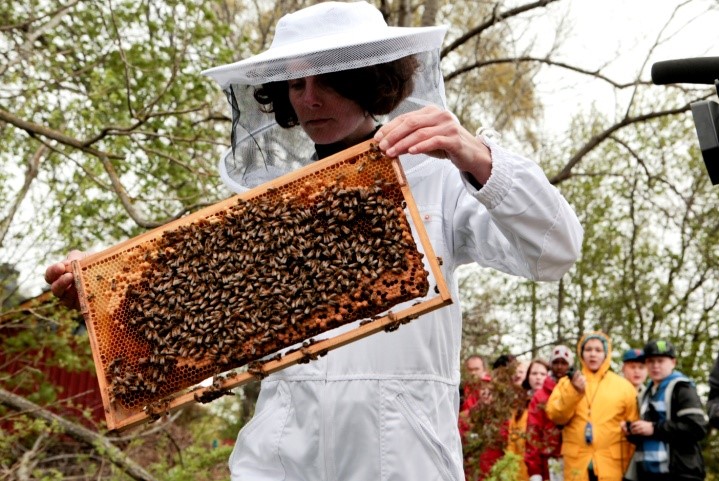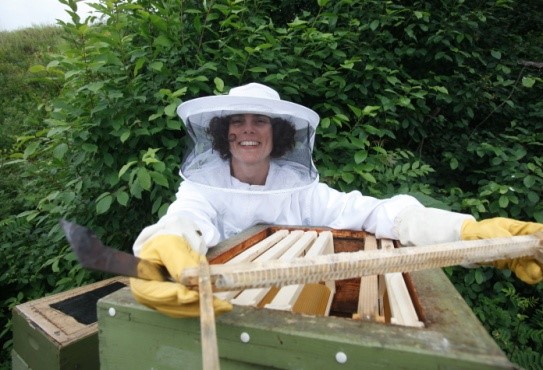Bees, Art and Science – an urban story
Interview by Lena Wietheger
|

|
|
Christina Stadlbauer
City Beekeeper combining Art and Science, shiatsu practitioner and scientist
|
Christina, you are Austrian and you hold a PhD in chemistry. How did you end up becoming a beekeeper in Brussels and what other roles do bees play in your life nowadays?
I used to be very afraid of flying, stinging insects that cannot be controlled.
When a friend took me to see his hives, the situation forced me to stand still and look - just to observe what was going on in this box with many thousands of animals. When concentrating on the detail, I suddenly became curious and what I saw triggered my interest to discover more. So I followed a beekeeping course and my fascination for bees has not stopped ever since.
 When I moved to Brussels I opted to follow a second beekeeping course - as that was the condition for placing my own hives.
When I moved to Brussels I opted to follow a second beekeeping course - as that was the condition for placing my own hives.
This is now my fifth year as a bee keeper in Brussels.
My bee colonies are placed in two different locations in Brussels and I have started marketing my bees’ honey, which is called ‘Le Schaerbeekois’.
Besides, today, most of my professional life revolves around beekeeping in urban environments, and I explore this topic at the interstices of art and science.
Can you describe the activities and challenges of your bee-related jobs?
From the beginning I considered city beekeeping as a communal cooperative endeavor. I have always looked for ways to introduce my bees to my fellow citizens and to share with them my fascination about bees. Bee keeping is something very archaic and there are many tales and stories about bees in various different cultures.
In 2010 I invited the citizens of Brussels to come and tell me one of their stories related to bees. In exchange for their story they would receive my Schaerbeekois honey (see here: http://vimeo.com/20843995).
 Moreover I have had school classes visiting and I have given various presentations about my bees. In one of these presentations I met a curator and coordinator who invited me to propose a project. I accepted and since 2012 I am on a research grant from the Kone foundation working with the Finnish university Aalto: It’s a 3 year project that was launched by the city of Helsinki, as part of BiophiliA-Base for Biological arts, a platform working with projects between arts and biological sciences. Every other month I am now in Finland, combining and exploring the various aspects of urban bees and their use as bio monitors as well as their inspiration for artistic expression.
Moreover I have had school classes visiting and I have given various presentations about my bees. In one of these presentations I met a curator and coordinator who invited me to propose a project. I accepted and since 2012 I am on a research grant from the Kone foundation working with the Finnish university Aalto: It’s a 3 year project that was launched by the city of Helsinki, as part of BiophiliA-Base for Biological arts, a platform working with projects between arts and biological sciences. Every other month I am now in Finland, combining and exploring the various aspects of urban bees and their use as bio monitors as well as their inspiration for artistic expression.
The activities span workshops, installations and interventions in public spaces, as well as lectures and (public) debate. See more here: http://melliferopolis.net/
My work is very inspiring and takes me in all kinds of directions and to various locations. Maybe the most difficult challenge has to do with the fact that some people are allergic to bees. It is only a small percentage of the population, but in the city, as space is very limited, it can become an issue.
Comparing your office-based jobs to your current outdoor job and travelling around Europe – has your step into self-employment paid off for you?
Most definitely! I would not trade back. However, reinventing your life every day anew can be exhausting and challenging as well. It demands discipline as well as structure, and sometimes lots of energy to motivate yourself! Collaborations are essential, because I cannot do everything alone!
And regarding the working life of a bee colony- can we humans learn anything from the bees to use in our professional behaviour? Are there any gender-related observations that you can share?
I think we can learn a lot from bees in many different ways. Somehow in a bee colony each individual knows what to do. Although there is no hierarchy and no management in the sense a company would define it, the tasks are divided amongst all the workers. Communication, as well as decision taking, works smoothly and swiftly. That is amazing if compared to some human work situations, and unimaginable in a human context when looking at the scale of approximately 20.000 (sometimes more) individual bees living together in one hive.
Drones, the male bees, have only one function in the hive, and that is fertilizing the queen. This happens once in their lives, as the act means certain death for the drone. Otherwise, they hang out in the hive and get fed, without having any work to do. In August, when the “mating season” is over, a massacre happens in the bee world, where all drones are killed and kicked out of the hive. They would be too much of a burden in the winter, when resources are scarce and the queen with some of the worker bees have to make it through the winter on eating what they have collected and stored as honey.
But, then again, a bee colony has to be seen as one entity, one animal called Der Bien, rather than seeing the individuals as separate entities. Because of that, we have to abstain from concepts like male and female, work division and tasks – it is rather an entity consisting of seemingly disconnected bees, which function well together in order to enable the species “honeybee” to survive.
Disclaimer -
Any views and opinions presented in this article are solely those of the author and do not necessarily reflect those of <company name>, nor do they constitute a legally binding agreement.
.png)
.png)